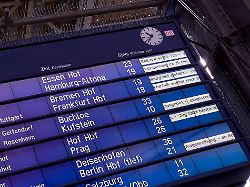“Then it will be better”
Wissing promises more punctual trains from the end of next year
8/3/2023, 5:35 am
At least 70 percent of long-distance trains should be on time, according to Deutsche Bahn’s self-imposed goal. So far this year, she hasn’t kept it. A general renovation of important routes should now help. Transport Minister Wissing predicts initial successes for the foreseeable future.
Federal Transport Minister Volker Wissing expects the first big step towards more punctuality on the railways at the end of 2024. “The poor condition of our main corridors is the most pressing problem we are now tackling,” said the FDP politician. As soon as the Riedbahn between Frankfurt and Mannheim has been renovated, which will be the case before Christmas next year, there will be the first “high-performance corridor” in Germany. “From then on it will be better.”
According to Wissing, every seventh long-distance train in Germany has to go through this corridor. “On the Riedbahn we have at least one operational disruption a day. With more than 300 passenger and freight trains a day, this has an enormous impact on operations throughout Germany.”
In the first six months of this year, only 68.7 percent of the ICE and IC trains were on time. Actually, Deutsche Bahn has set itself a goal of achieving a punctuality rate of more than 70 percent in long-distance transport for the current year. The main reason for the delays is the ailing infrastructure in many places: large parts of the DB route network, which covers a good 33,000 kilometers, are in urgent need of renovation, and there are disruptions on some routes almost every day. A “general renovation” of important corridors is now planned. The Riedbahn makes the start.
According to Wissing, this will be blocked for five months from July 15, 2024 – shortly after the European Football Championship in Germany. During this time, everything will be torn out and made new: 152 points, 140 kilometers of overhead lines, 117 kilometers of tracks and more. “This brings us improved punctuality and improved train operations at maximum speed,” said the minister. “You have to imagine it like operating on a main artery in the body and pinching it off. You have to do a bypass beforehand, otherwise it doesn’t lead to healing but to the patient collapsing. That’s why we have to now, before we can block the first corridor, lay bypasses. And we do that in two ways. On the one hand, branch lines are upgraded and at the same time rail replacement services are set up because you can’t shift everything from a main corridor to branch lines,” said Wissing.
In 2025, two corridors will be closed, namely the Emmerich-Oberhausen and Hamburg-Berlin routes. Deutsche Bahn aims to ensure a high-performance network by 2030 with the general renovations on 40 routes, on which traffic runs more reliably and more trains can also run.
Renovation before new construction
Wissing went on to say that more punctual trains can be achieved primarily through the renovation of the existing network, not through the construction of new routes. “That’s why the discussions about building new rails for more punctuality are technically irrelevant. The problem is the core corridors, they are no longer efficient. If you have a funnel where the flow is blocked, then you can’t say that solves it by widening the cone. Of course, we also need the new buildings built as part of the Deutschlandtakt for future needs.” For this purpose, around 1000 kilometers of new routes are in the requirement plan.
“But they don’t change anything about punctuality and don’t quickly provide more capacity. That’s only possible with corridor renovation.” With the Deutschlandtakt, long-distance traffic between the metropolitan regions is to be more closely timed. The trains between the largest cities should run every half hour. They should arrive at central train stations at about the same time and leave again shortly thereafter.
No fixed date for the Deutschlandtakt
With a view to statements by the railway commissioner and Secretary of State for Transport Michael Theurer from the FDP, Wissing said that there had been a lot of misunderstanding that the Germany cycle would not come until 2070. “The Germany cycle is the adaptation of the infrastructure to a specific timetable,” said the minister. “What people in Germany now expect above all is that the railways will be more punctual with the existing timetable. However, this has nothing to do directly with the Germany cycle, but with the condition of the existing network. Work in parallel we use the Deutschlandtakt so that the cities can be better connected to each other and the connections to the regional network can also be reached, so that you have smooth connections.” In parts there is already the beat.
The Deutschlandtakt is essentially a modified timetable system, said Wissing. “There is no final date for this. We are constantly working on adapting the infrastructure to the needs of the timetable. Routes are constantly being added in stages. Each stage brings new leaps in offerings and significant timetable improvements. The Germany clock system is a permanently ongoing project.”
